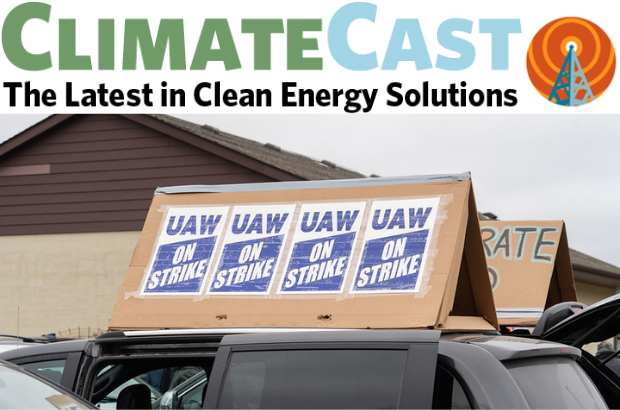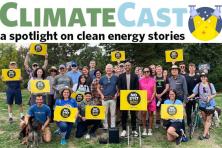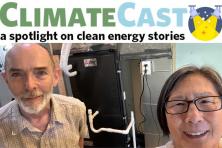Autoworker strike underscores the need for a just transition
In addition to race, the clean energy transition is playing a central role, albeit unspoken, in the ongoing UAW strike against the “Big Three” automakers. While focusing especially on CEO-to-worker pay, the strike is not just about wages and benefits but also about the auto industry's future. As climate policies and investments help move the market and consumers’ desires shift toward electric-powered transportation, technology is changing, and workers need support in that transition. They are demanding that manufacturers commit to a just transition for workers. Given how EV production has already affected some auto industry jobs, workers want manufacturers to bring more development work in-house and commit to long-term competitiveness against non-union EV manufacturers, including union contracts covering future factories.
While many industry executives have claimed that it comes down to either paying workers more or meeting the moment of producing more electric vehicles, unions have countered the misperception that such a trade-off is inevitable. “The UAW supports and is ready for the transition to a clean auto industry,” UAW President Shawn Fain said in a prepared statement. “But the EV transition must be a just transition that ensures auto workers have a place in the new economy.”
Lawsuits for a cleaner future
According to the UN Environmental Program, climate and environmental litigation has doubled in the last five years, as it has proven an effective, albeit time-consuming, method of holding polluters accountable. The kinds of arguments being made around the globe include: “human rights laws; administrative laws like environmental impact statements and zoning laws; private law claims such as nuisance, trespass, and negligence; corporate laws such as shareholder disclosure obligations and corporate governance; and consumer protection laws targeting greenwashing” etc.
A few weeks ago, we shared news about Montana youths' successful and precedent-setting lawsuit. The European Court of Human Rights is hearing a case brought forward by six young Portuguese people against European countries for their inaction on climate change. The youths are fighting overt climate denialism at the highest levels of political power; after a summer of blistering heat waves and destructive wildfires across Europe, the Greek government declared in a court statement that “the effects of climate change as recorded so far do not seem to directly affect human life or human health,” a galling pronouncement directly contradicted by the heat-related deaths of 62,000 people in Europe during the summer of 2022.
Back in the United States, California joined New Jersey, Massachusetts, Minnesota, and numerous localities in filing suit this week against oil companies for willfully misleading the public regarding the negative health and climate impacts of burning gas and oil. Taking a page from government lawsuits against the tobacco industry, states are targeting the oil and gas industries’ massive coffers to pay for harming the public. If these suits succeed, some climate justice advocates seek to have this money earmarked to bankroll climate incentives, resilience measures, and even reparations.
Delay, downplaying, and deflection are the new climate denial
Bizarre proclamations from the Greek government aside, blatant climate denialism in the public square is receding. However, several schools of thought regarding the climate crisis have emerged that are similarly counterproductive at motivating the necessary action to stave off worsening climate impacts. In an interview with Vox, climate scientist Michael Mann explains that straight-up denial has largely given way to delay, downplaying, and deflection, unsurprisingly originating from fossil fuel interests and conservative think tanks. Mann concludes, “the most important thing an individual can do is to use their voice and their vote.”
What we’re listening to
Climate journalist David Roberts’ podcast Volts is indispensable for anyone inclined to geek out on the details of practical responses to the climate crisis — how smart and well-organized people are right now overcoming technological and political obstacles to do something real to combat climate chaos. We’ve bookmarked one installment from last month that we’re listening to on repeat: David talks with 350.org organizer Jeff Ordower about how climate activists can get things built. How can we take a movement that has had great success saying NO to coal trains, gas pipelines, and environmental degradation in communities and turn its power to say YES to long-distance transmission lines, battery manufacturing, and clean energy power plants?





